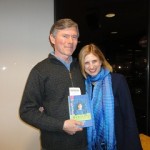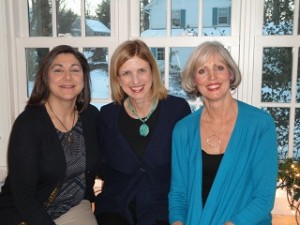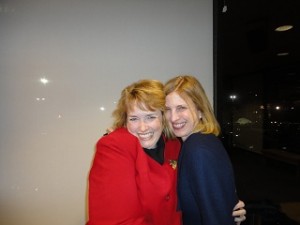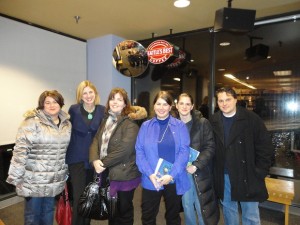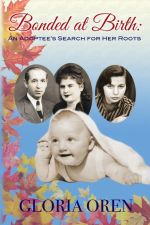
In honor of National Adoption Awareness Month, we feature an interview with Gloria Oren, award-winning author of “Bonded at Birth: An Adoptee’s Search for Her Roots.” Oren was adopted as an infant in Brooklyn, New York in 1955, during a period when secrecy surrounded adoption. She grew up in New York and Israel, and now lives in Washington State. In conversation with Jessica O’Dwyer, Oren discusses her lifelong quest to fill in the blanks of her early life, her search for her birth mother, and the reasons she wrote a memoir. Oren is founder of “Women Writers Editors Agents and Publishers” on Facebook, serves as editor of “Muse It Up Publishing,” and belongs to the Redmond Association of Spokenword and Society of Good Grammar. Learn more at gloriaoren.com.

What made you write “Bonded at Birth”?
The realization that adoptees have the right to their own information regarding their origins and medical histories. I had almost no information to go on, yet things have a way of happening, and because of them and the help of others, I was found.
What do you hope readers will find in the memoir?
I want my readers to be inspired. I want to share my message that there is no place for secrecy in adoption.
I had to share my story with adult adoptees who wish to search but hesitate, adoptive parents confronted by their adopted child’s wish to search, and by birth parents who fear searching — not wanting to intrude on their biological offspring’s life. “Bonded at Birth” will also attract memoir readers who enjoy a unique story. And couples contemplating adoption will learn the damage secrecy can lead to, and with hope, this book will ensure that they will be the ones to talk to their adopted children about their adoptions.
Your adoptive parents, Zindel and Hannah, were born in the early 1900s in Eastern Europe and immigrated to Brooklyn. You were born in 1955. You learned of your adoption at the age of four, through an anonymous note. Your adoptive mother, Hannah, told you to keep your adoption a secret, using a tone you describe as “serious, perhaps frightened.” What do you think she was afraid of?
I really don’t know what she was afraid of. Perhaps she feared the evil eye since their first adopted child died at a young age. Perhaps it was just the times. Today people are more accepting of adoption. The stigma of the 50s no longer exists.
In the book’s introduction, you ask, “Who was I? Where did I come from? Did I have roots?” At what age did you begin to grapple with these questions? Did you discuss them with anyone?
The questions came up from around ten, but intensified on my eleventh birthday when my adoptive father died. I felt like an outsider. I was kept in my room, allowed to the kitchen for meals, but was kept away from the mourning scene. I had lots of time to think. But since the fact that I was adopted was kept secret I didn’t discuss them until a few years later, but not getting any further in gaining info. The last time I questioned my adoptive mother was when I was eighteen. Still no further info was provided so I stopped bringing it up. But the questions were always there.
What advice would you give adoptive parents today, regarding truth-telling and secrecy?
My advice to adoptive parents today is to recognize the fact that your adopted child has a right to know the truth of his origins and heritage. Please don’t keep it a secret. Tell him what you know, and if you don’t know, admit it. Also offer to try to find out for him or her. Whatever you do, please don’t resort to secrecy.
Your birth mother, Marcia (Fritz) McCabe, was seventeen and unmarried when she placed you for adoption. What led to her decision?
She was young and living in Nova Scotia at the time. In the 50s, it was a place where everyone knew each other and word of mouth spread quickly. At the time, teen pregnancy was a stigma and not looked at in a positive manner. Her mother didn’t want anyone to know so she took her to New York on the pretense of visiting relatives, but [my birth mother] really went to live with my adoptive parents until I was born. She had no say as she was a minor and her mother did what she thought was best.
You were twenty-three when your adoptive mother Hannah died. Soon after, you began to search in earnest for your birth mother, Marcia. The advent of the internet allowed you to join online communities where, for the first time, you corresponded with other people who are adopted. Can you talk about the impact of that connection?
It was like a whole new world opened up for me. To my knowledge, I had never met or spoken to another adoptee. Now, suddenly I was meeting so many. I even participated in a Reg Day event one year and met other adoptees in person. (Years ago, on National Adoption Awareness Day, adoption registries held fairs in malls throughout the States. The one I helped with was in Bellevue, WA. We had forms for people to take, fill out, and send to the registry in hopes of a match. It’s a shame Reg Day exists no longer. The fairs were well attended.)
What I learned through these communications was that adoptees are drawn to each other. When they meet, they share a common language. They share the same questions, fears, rejections and successes. I’m still in contact with some of those I met back then. To the adoptive parents reading this I can say don’t fear the connections your adoptee makes with other adoptees. It is a very helpful step in overcoming many of the issues of adoption. They will love you more for allowing them to openly discuss what bothers them, rather than keeping it secretive.
You were almost forty-one when you reunited with your birth mother Marcia in 1996. You describe your feelings this way: “For once in forty-one years I am a completed puzzle, a whole person, and for the first time in many months I am sleeping well at night and not getting up tired.” What a beautiful description of a life-changing event! Earlier in the book, you emphasize your love and appreciation for Zindel and Hannah, and your life together. How are you able to hold both these realities?
How are kids from families experiencing divorce and remarriage able to cope with multiple families? A child has enough love to go around. The relationships are different. My adoptive parents raised me and did the physical work involved, but my birth mother gave me life. I love them all and appreciate all that each provided to me as I grew up and post-reunion.
At some point, Marcia legally adopted you. When did the adoption occur, and how was the decision made to do this?
Post-reunion Marcia asked me if I would want her to adopt me back so she could legally claim me as her daughter. I had no problem with this. She created me and carried me in her womb for nine months, and having not seen her for forty-one years, it was an easy decision. My adoptive parents were no longer living and I wanted my children to have a grandmother.
You never met your birth father because he died eight years before your reunion with Marcia. But through Facebook and other social media, you’ve connected with half-siblings and cousins. Do you have tips or recommendations for other people searching for relatives?
Read as much as you can about adoption search and reunion. Be ready for the worst, and rejoice in your successes. Be accommodating. Build a relationship slowly, let them take it in at their pace.
What has been the response to your reunion from relatives in your birth family?
We are in contact, by phone, email, etc. I’ve met some in person. They were welcoming, but there were some who to this date are still having their doubts.
And from the family of Zindel and Hannah, your adoptive family?
My adoptive family members were excited that I was able to reunite with my birth mother. Actually, I got most of my information from my cousin. She was ten when I was born and remembers a lot from that time. They were all accepting of the fact that my birth mother wanted to adopt me back. I’m still in contact with them, so I guess they had no problem with it. At least no one has said they did. One did say he was concerned that my feelings for my parents would diminish but that is not so. I love them each in a different way.
Do you have any parting words for an adoptive parent, a person who is adopted, or a birth parent who might be reading this?
Read books, use Internet resources, connect with other adoptees online and off and be ready for anything before you start your search. Adoptive parents – be supportive, helpful and understanding. Birth parents – don’t hesitate, most adoptees want to be found.
Thank you so much, Gloria. I appreciate your insights and candor.
Jessica O’Dwyer is the author of “Mamalita: An Adoption Memoir.”


 ShareThis
ShareThis
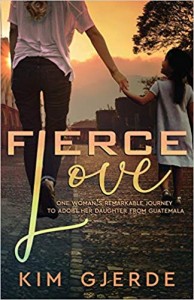



 ShareThis
ShareThis

